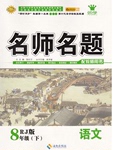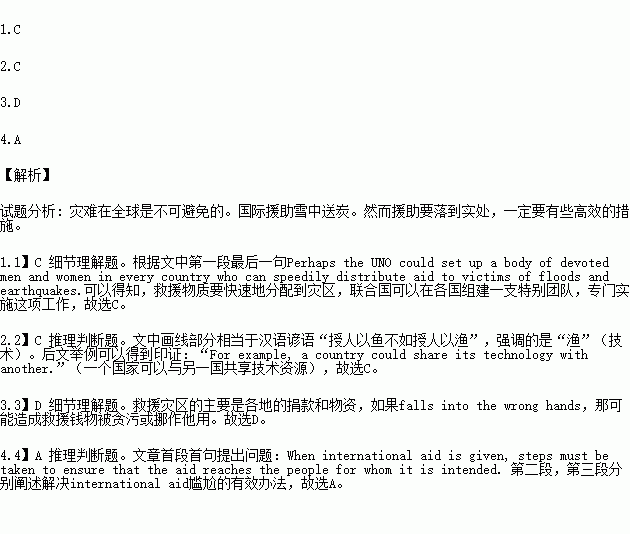题目内容
When international aid is given, steps must be taken to ensure (确保)that the aid reaches the people for whom it is intended. The way to achieve this may not be simple. It is very difficult for a nation to give help directly to people in another nation. The United Nations Organiztion(UNO) could undertake to direct the distribution of aid. Here however rises the problem of costs. Also tied with this is time. Perhaps the UNO could set up a body of devoted men and women in every country who can speedily distribute aid to victims of floods and earthquakes.
More than the help that one nation can give to another during a disaster, it would be more effective to give other forms of help during normal times. A common proverb says, “Give me a fish and I eat for day, teach me to fish and I eat for a lifetime.” If we follow this wise saying, it would be right to teach people from less developed nations to take care of themselves. For example, a country could share its technology with another. This could be in simple areas like agriculture or in more complex areas like medical and health care or even in building satellites. Even small country is able to help less developed nations. Sometimes what is take for granted, like the setting up of a water purification plant or the administration of a school, could be useful for countries which are looking about to solve common problems. It does not cost much to share such simple things. Exchange students could be attached for a number of months or years and learn the required craft while on the site. They can then take their knowledge back to their homelands and if necessary come back from time to time to clear doubts or to update themselves. Such aid will be truly helpful and there is no chance of it being temporary or of it falling into the wrong hands.
Many countries run extensive courses in all sorts of skills. It will not cost much to include deserving foreigners in these courses. Besides giving effective help to the countries concerned, there is also the build-up of friendships to consider. Giving direct help by giving materials may be effective in the short run and must continue to be given in the event of emergencies. However, in the long run what is really effective would be the sharing of knowledge.
1.According to the author, how could international aid reach the victims in time?
A. By solving the cost problems.
B. By solving the transportation problems.
C. By setting up a body of devoted people in every country.
D. By relying on the direct distribution of the UNO.
2.What does the author try to express in the underlined sentence?
A. Providing food is vital.
B. Learning to fish is helpful.
C. Teaching skills is essential.
D. Looking after others is important.
3.Which aid is likely to fall into the wrong hands?
A. A medical team.B. An exchange program.
C. A water plant.D. Financial support.
4.What can we infer about international aid from the passage?
A. It is facing difficulties.
B. It is unnecessary during normal times.
C. It should be given in the form of materials.
D. It has gained support developed countries.
 优学名师名题系列答案
优学名师名题系列答案
